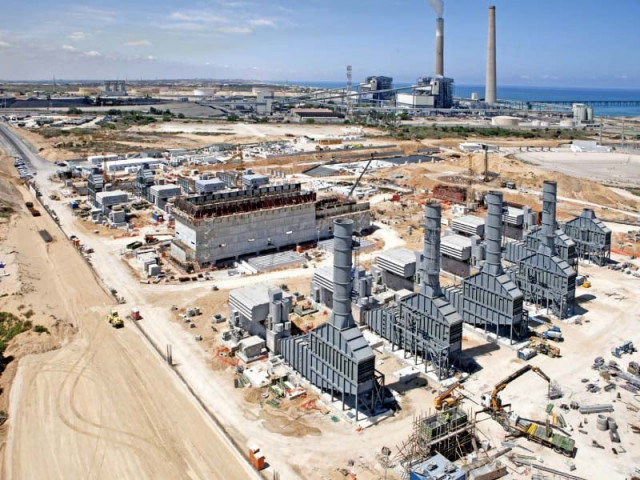Power generation falls as dry spell cuts hydel output
Beijing model for electricity transmission to be adopted, PM Abbasi told

General Electric had installed such power plants with a capacity of 5,500 megawatts in Egypt in a short span of seven months. PHOTO: AFP
With smog-related power outages persisting, the Prime Minister on Tuesday chaired a meeting to review the power generation and demand in the country.
The ruling camp, particularly the prime minister, had made claims that the country would be rid of power outages in November. These claims may, however, cause the government some embarrassment, as owing to the dry spell, many of the hydel power plants are not producing electricity to full capacity.
At the meeting, PM Abbasi was briefed on the recent power outages in South Punjab and upper Sindh, according to a press release from the Prime Minister Office. The meeting was informed that due to the dense smog caused by the persistent dry spell, transmission lines were tripping.
Installed capacity increases, but power production falls
The dry spell, the meeting was told, was also causing water shortage, which in turn was hindering the power generated by hydroelectric plants.
On October 27, hydel generation stood at 2167 MW compared to the 3088 MW generated last year on the same day.
The meeting was also briefed on the non-availability of gas, due to scheduled LNG outages, which in turn led to low energy generation from LNG plants.
“However, effective measures have been taken to eliminate the demand and supply gap, resulting in restoration of required capacity. Except for smog-related unscheduled outages, power is being supplied to all areas similar to the situation prior to October 30th, 2017,” the press release said.
Regulator cuts tariff by up to 18.5% for new Thar power projects
Abbasi was informed that all possible efforts were being made to ensure that the country was able to tackle the smog-related outages. In the same context, a team of professionals was also sent to China to study Beijing’s model of electricity transmission for smog-ridden areas.
Abbasi was also briefed about the solarisation of tube-wells in Balochistan.
The PM said that plans should be finalised on a war-footing basis to ensure minimum losses in terms of electricity bills and due payments on tube-well connections. Abbasi then directed the AEDB to develop a concept paper.
Nuclear power plants faced funding cuts in bid to contain budget deficit
He emphasised the need for greater coordination among relevant departments so that contingency plans could be developed for any situation.
Abbasi also ordered a long-term power sector programme with clear targets for generating power from various sources. He said that would enable the country to have reliable yet affordable electricity the entire year.
According to the press release, Minister for Power Awais Leghari, Power and Petroleum Division secretaries and concerned senior government officials were present at the meeting.


















COMMENTS
Comments are moderated and generally will be posted if they are on-topic and not abusive.
For more information, please see our Comments FAQ